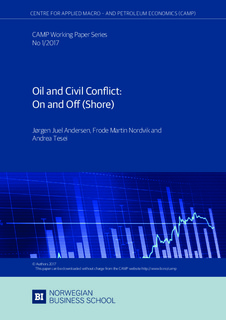| dc.contributor.author | Andersen, Jørgen Juel | |
| dc.contributor.author | Nordvik, Frode Martin | |
| dc.contributor.author | Tesei, Andrea | |
| dc.date.accessioned | 2017-02-02T12:12:07Z | |
| dc.date.available | 2017-02-02T12:12:07Z | |
| dc.date.issued | 2017 | |
| dc.identifier.issn | 1892-2198 | |
| dc.identifier.uri | http://hdl.handle.net/11250/2429275 | |
| dc.description.abstract | We reconsider the relationship between oil and conflict, focusing on the location of oil resources. In a panel of 132 countries over the period 1962-2009, we show that oil windfalls increase the probability of conflict in onshore-rich countries, while they decrease this probability in offshore-rich countries. We use a simple model of conflict to illustrate how these opposite effects can be explained by a fighting capacity mechanism, whereby the government can use offshore oil income to increase its fighting capacity, while onshore oil may be looted by oppositional groups to finance a rebellion. We provide empirical evidence supporting this interpretation: we find that oil windfalls increase both the number and strength of active rebel groups in onshore-rich countries, while they strengthen the government in offshore-rich ones. | nb_NO |
| dc.language.iso | eng | nb_NO |
| dc.publisher | BI Norwegian Business School | nb_NO |
| dc.relation.ispartofseries | CAMP Working Paper Series;1/2017 | |
| dc.subject | Natural Resources | nb_NO |
| dc.subject | Conflict | nb_NO |
| dc.title | Oil and Civil Conflict: On and Off (Shore) | nb_NO |
| dc.type | Working paper | nb_NO |
| dc.source.pagenumber | 34 | nb_NO |
